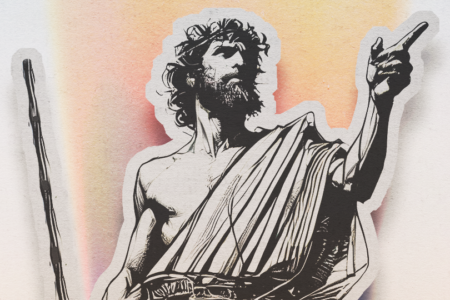Speaking Truth to Power
Israel My Glory In Depth is a video interview series that explores the author’s motivation in writing their article.How John the Baptist confronted the rulers of His day
Celebrated Jewish cartoonist Bob Mankoff once said in an interview, “I know everybody wants humor to be subversive and speak truth to power. I don’t think power has been listening.”1
Long before the phrase speak truth to power became popular, Israel’s prophets stood as the quintessence of this endeavor. Whether it was Moses to Pharaoh or John the Baptist to Herod Antipas, Israel’s prophets spoke the truth. Yet we often find that Mankoff was right: Power wasn’t listening.
Such was the case for John the Baptist, as both the religious and political leaders of the day repudiated his message. Fulfilling Isaiah’s prophecy, John’s confrontation with authority was a course God charted for him more than 700 years earlier. He was “the voice of one crying in the wilderness: ‘Prepare the way of the Lᴏʀᴅ” (Isa. 40:3). Isaiah continued,
Make straight in the desert a highway for our God. Every valley shall be exalted and every mountain and hill brought low; the crooked places shall be made straight and the rough places smooth (vv. 3–4).
Isaiah’s mandate for God’s messenger deals poetically with people: The Baptizer was to prepare them for the Lord. Those holding a high status with positions of authority (“mountains and hills”) would be humbled, and those holding a lowly status (“valleys”) would receive hope. The proverbial playing field would be leveled with a single message before the King of Israel’s arrival: All have sinned, and all must repent (cf. Lk. 3:5).
A lowly state does not preclude forgiveness, nor does an exalted state nullify its necessity. Nor can someone obtain forgiveness with a mere outward profession of faith. Repentance involves an inward change of heart and mind.
The Religious Elite
The religious elitists spurned John’s call to repentance on the basis of their lineage. It was popularly held at the time that all Israelites were secure in the world to come (Messiah’s Kingdom) simply because of Abraham’s righteousness. Bible scholar Alfred Edersheim wrote,
This appears not only from the New Testament, from Philo, and Josephus, but from many Rabbinic passages. “The merits of the Fathers,” is one of the commonest phrases in the mouth of the Rabbis. Abraham was represented as sitting at the gate of Gehenna [Hell], to deliver any Israelite who otherwise might have been consigned to its terrors.2
John, however, vehemently opposed his countrymen over this notion when he told the religious rulers specifically, “Brood of vipers! Who warned you to flee from the wrath to come? Therefore bear fruits worthy of repentance, and do not think to say to yourselves, ‘We have Abraham as our father’” (Mt. 3:7–9).
John’s message was consistent with the Tanakh (Old Testament). Historically, God punished Israelites who rebelled against Him (Num. 16:31–33); and the coming judgment prior to the Messianic Kingdom would be no different (Ezek. 20:33–38).
John’s proclamation was particularly at odds with the Pharisees, whose primary concern was external purity through keeping the commandments (mitzvot). However, external purity hardly produces a clean heart (inner person). Yet, their external purity appealed to the public. The ancient Jewish historian Josephus confirmed that, of all the Jewish sects, the Pharisees “have the multitude.”3
The idea that the Pharisees needed to repent challenged their public image. Invariably, they found themselves competing with John (and later, with Jesus) for public support when they saw how many people went out to be baptized (cf. Jn. 4:1).
Scripture clearly reveals that, generally speaking, the Pharisees did not submit to John’s message. It was the Pharisees who sent a delegation from Jerusalem to ask John, “Who are you?” (1:19; cf. v. 24) and to investigate him.
Later, when Jesus pressed the chief leaders about whether John’s baptism was from heaven, they knew they couldn’t affirm it because they didn’t believe John (Mt. 21:23–25). Luke explicitly stated, “The Pharisees and the lawyers rejected God’s purpose for themselves, not having been baptized by John” (Lk. 7:30, NASB).
The Political Elite
Although John the Baptist fiercely opposed the religious elite, it was the political elite that managed to silence him.
Herod’s son Antipas inherited a portion of his father’s kingdom (Perea and western Galilee) where John ministered. Infamously, Herod Antipas married his half-brother’s wife, Herodias, a woman who was also his niece. This union violated God’s law (Lev. 18:14, 16). John, in the “spirit and power of Elijah” (Lk. 1:17), responded as Elijah did to Israel’s wicked King Ahab and his evil wife Jezebel: John spoke truth to power.
Tax collectors and soldiers listened to John’s correction about their wickedness (Lk. 3:13–14); but when John rebuked Herod Antipas for his marriage “and for all the evils which Herod had done, . . . he shut John up in prison” (vv. 19–20).
Antipas was torn about John. In fact, “Herod feared John, knowing that he was a just and holy man, and he protected him . . . and heard him gladly” (Mk. 6:20). Antipas knew he had punished someone who upbraided him rightfully, and he refused to kill John because he regarded him as a prophet.
Later, Antipas gave a feast for many nobles. Upon witnessing Herodias’s daughter dance seductively for the party, Antipas—likely in a drunken state—rashly vowed to give the young girl anything she wanted. Herodias’s cruelty and vindictiveness became evident when she prompted her daughter to request “John the Baptist’s head here on a platter” (Mt. 14:8). Herod reluctantly obliged. What Jezebel failed to do to Elijah, Herodias did to John.
Rejecting the Message
As the Messiah’s forerunner, John famously passed the proverbial baton of ministry along to Jesus in God’s time (Jn. 3:30); and the same opposition was passed with it.
The two had extremely different styles. John, an ascetic, came “neither eating . . . nor drinking”; but the Messiah, not an ascetic, came “eating and drinking” (Lk. 7:33–34). Nevertheless, their messages were the same: “Repent, for the kingdom of heaven is at hand” (Mt. 3:2; 4:17).
Jesus was forced to move about to avoid being hindered by the religious opposition when He was found to be making more disciples than John with this message. Previously, John had been forced to do the same (Jn. 4:1–3). Eventually, Jesus used the differing styles between John and Himself to trap the Pharisees (Lk. 7:31–35). They had rejected the forerunner for his asceticism, and they rejected the Messiah for His accommodations—which, in the end—exposed the truth: What they really rejected was the message itself.
Jesus’ ministry haunted Antipas because of John’s fate (Mt. 14:2), and Jesus’ popularity brought the political and religious elites together to silence the message.
John the Baptist was not Elijah because he was not received; therefore, Elijah is still expected before the coming Day of the Lord (Mal. 4:6; Mk. 9:12–13). This means that Israel’s collective repentance, prompted by Elijah, is still future; and unfortunately, the terrible “time of Jacob’s trouble” (Jer. 30:7) spoken of by the prophet Jeremiah still awaits.
One day, God will restore the Kingdom to Israel (Acts 1:6–7). Meanwhile, the message is the same today as it was then: Repent! We must acknowledge our sin and be accountable to God, who graciously makes forgiveness and eternal life available to everyone regardless of race, religion, or background through faith in Jesus, the Messiah of Israel.
To quote Billy Graham (1918–2018), a man who also spoke truth to power, “During all my years as an evangelist, my message has always been the Gospel of Christ. It is not a western religion, nor is it a message of one culture or political system. . . . It is a message of life and hope for the world.”4
ENDNOTES
-
-
- “New Yorker Cartoon Editor Explores What Makes Us Get It,” December 29, 2014, transcript of NPR Fresh Air broadcast (tinyurl.com/Get-it-2).
- Alfred Edersheim, The Life and Times of Jesus the Messiah (Grand Rapids, MI: Eerdmans, 1981), 271.
- Flavius Josephus, Antiquities 13.10.6 (298), in The Works of Josephus: New Updated Edition, trans. William Whiston (Peabody, MA: Hendrickson Publishers, 1987), 355.
- Billy Graham, “In His Own Words” (memorial.billygraham.org/in-his-own-words).
Photo: Adobe Stock
-







